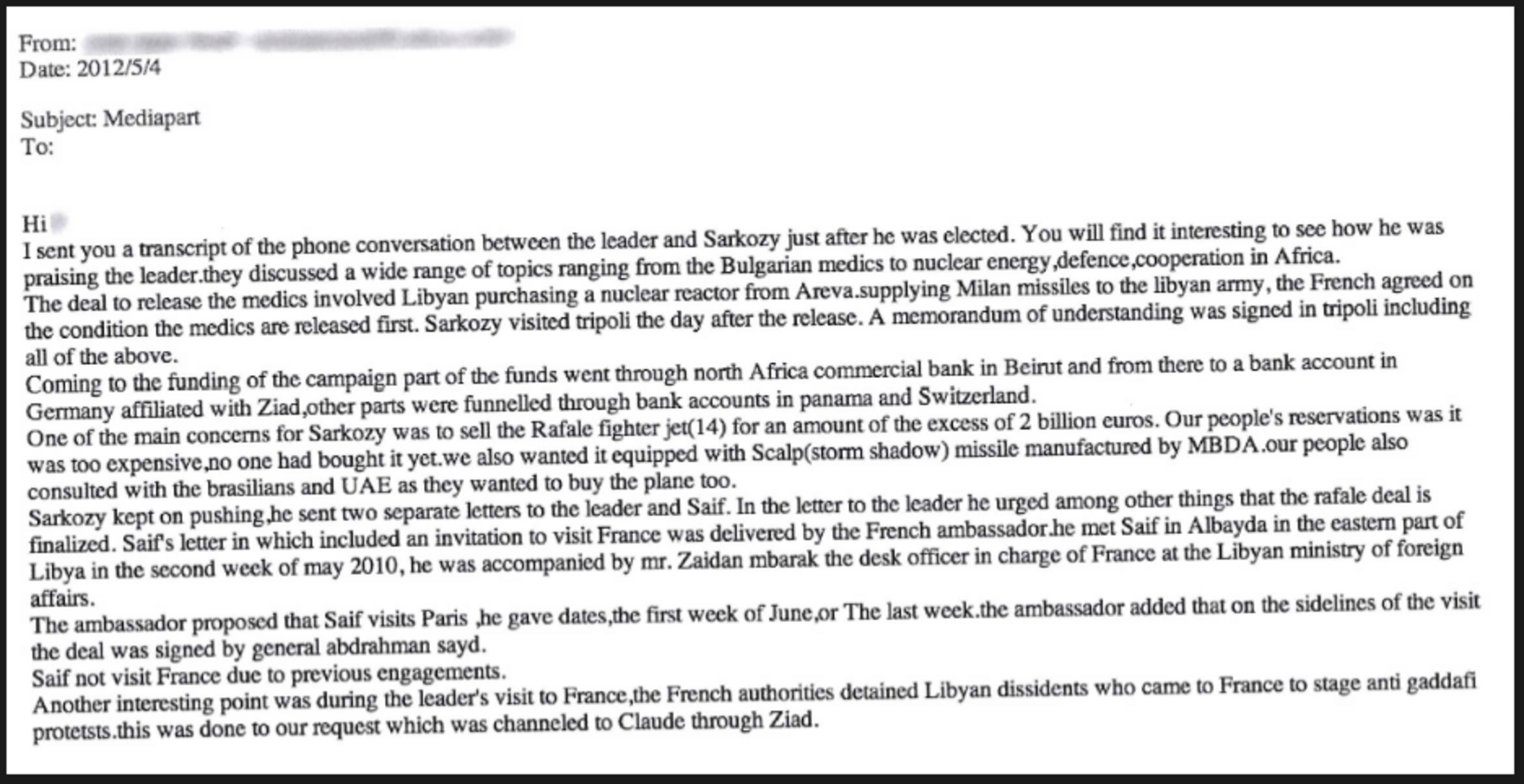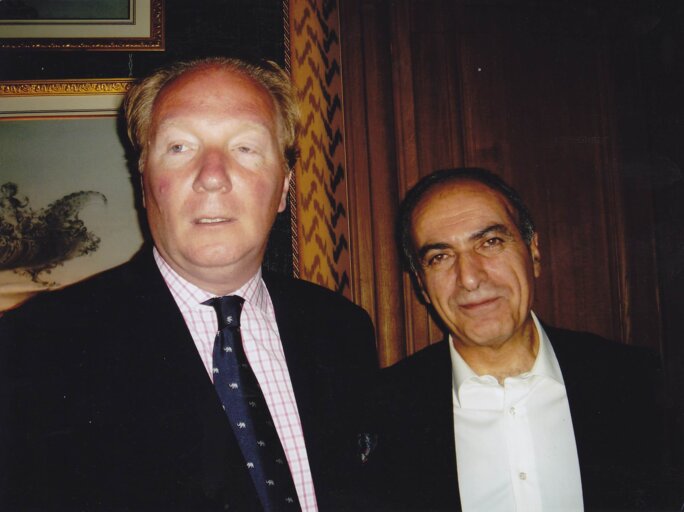In a series of escalating revelations, Mohammed Ismail, a former aide to Saïf al-Islam, the son of the late Libyan dictator Muammar Gaddafi, has confirmed claims that Gaddafi funded the 2007 election campaign of former French president Nicolas Sarkozy, Mediapart can reveal.
“Coming to the funding of the [Sarkozy 2007 election] campaign, part of the funds went through North Africa Commercial Bank in Beirut, and from there to a bank account in Germany affiliated with Ziad,” Ismail told Mediapart, referring to Ziad Takieddine, a Paris-based businessman and arms dealer who worked as a key advisor to Sarkozy’s aides in their dealings with the former Libyan regime.

“Other parts were funnelled through bank accounts in Panama and Switzerland,” he added.
On Thursday, French state television channel France 2 aired an interview with Gaddafi’s official interpreter, Moftah Missouri, who told its current affairs programme Complément d’enquête that the dictator had told him, in person and verbally, that he had given Sarkozy 20 million dollars towards his campaign finances. Missouri also confirms the authenticity of a document published by Mediapart on April 28th 2012 in which the Gaddafi funding of Sarkozy’s campaign is detailed (see links to more articles at the bottom of page 2), and which was signed by he then-head of Libya's foreign intelligence agency, Moussa Koussa.
The document set out how the Gaddafi regime had agreed to “support the electoral campaign” of Sarkozy for the 2007 presidential elections, and for the “sum of fifty million euros”.
Mediapart entered into contact with Ismail, who is currently living in hiding, via a French intermediary. He first gave this website details of Gaddafi’s illegal funding of Sarkozy’s campaign in email correspondence in May 2012, when he was exiled in an Arab country - which is deliberately unidentified by Mediapart – and asked for his name to be withheld.

Enlargement : Illustration 2

Ismail, described in a 2011 report by The Guardian newspaper as a “key figure” in Colonel Muammar Gaddafi's regime, had by then already passed on a transcript of newly-elected Nicolas Sarkozy’s first phone conversation, after he was elected French president, with Colonel Gaddafi. The veracity of the contents of the transcription has never been challenged.
Mediapart is now publishing Ismail’s account of the illegal funding after numerous verifications of the information provided in his email correspondence, and notably his recent agreement to publish his identity following the launching in April of a judicial investigation in France into the allegations that Gaddafi funded Sarkozy’s campaign.
Ziad Takieddine, who holds dual French and Lebanese nationalities, was last year placed under formal investigation - one step short of charges being brought - for “misappropriation of company assets and funds” as part of his suspected role in the illegal financing, via French arms sales to Pakistan and Saudi Arabia, of former French prime minister Edouard Balladur's 1995 presidential election campaign. Nicolas Sarkozy was Balladur's budget minister and became his presidential campaign spokesman.
But importantly, Takieddine continued to work as a secret intermediary for weapons and security contracts negotiated by Sarkozy’s aides after the latter became interior minister in 2002. Takkiedine, whose passport was confiscated by judges leading the investigation, was last month jailed after it was discovered he had secretly acquired a diplomatic passport from the Dominican Republic.
Among his numerous appearances for questioning before Judges Renaud Van Ruymbeke and Roger Le Loire leading the probe into the 1995 arms contracts, and which has developed into a far-reaching investigation of his role in deals set-up by Sarkozy’s aides in the 2000s, Takkiedine gave a statement in December 2012 in which he testified: “The important period lasts between December 2006 and January 2007,” referring to the period when Nicolas Sarkozy was interior minister and newly-approved presidential election candidate for the conservative UMP party.
“During this period, Bashir Saleh [Editor’s note: president of the Libyan African Portfolio one of the main investment arms of the regime] came several times to see Monsieur [Claude] Guéant at the interior ministry, when he was the minister’s chief-of-staff,” Takieddine said, adding: “During these meetings, Monsieur Guéant gave Monsieur Saleh the necessary banking details for payments.”
Ismail’s account of the financial path of Gaddafi’s funding of Sarkozy’s campaign is quite logical. The North Africa Commercial Bank (NACB) was controlled by the Libyan state. The German bank accounts of Ziad Takieddine have already been established by the French judicial investigation into his role in illegal political funding. Takieddine had several accounts opened with the Deutsche Bank in Frankfurt, held under the names of three offshore companies – Tristar, Rossfield and Como. In 2007 and 2008, two of these companies were credited with commission fees from security contracts negotiated with Libya and which involved the French company Amésys (see Mediapart’s investigation here).
In Ismail’s email correspondence, he claimed that the “agreement” to the freeing by Libya in July 2007, shortly after Sarkozy’s election, of five Bulgarian nurses and a Palestinian doctor imprisoned for life in Libya for allegedly conspiring to infect children with the HIV virus, “involved Libyan [sic] purchasing a nuclear reactor from Areva and supplying Milan missiles to the Libyan army”.
A 'man of confidence'
In his correspondence with Mediapart, Ismail also insisted that “one of the main concerns of preoccupations of Sarkozy was to sell the Rafale jet fighter for an amount [in] excess of 2 billlion euros”. He also referred to a request by the Libyan authorities that, in preparation for Gaddafi’s visit to meet President Sarkozy in Paris in December 2007, locally-based opponents should be arrested beforehand. The demand, said Ismail, was communicated to Claude Guéant, then Sarkozy’s presidential chief-of-staff, via Ziad Takieddine.
Ismail’s account of the financial network of Gaddafi’s funding of Sarkozy’s election campaign match in part a confidential report prepared by Jean-Charles Brisard, who heads a Swiss-based company specialised in economic intelligence. Brisard, who is French, was once an advisor on terrorist issues to several French government departments and has served since 2002 as an investigator for lawyers representing relatives of the victims of the September 11th 2001 terrorist attacks in the US. In 2008, then-President Nicolas Sarkozy awarded him the rank of Knight of the French National Order of Merit.
Brisard wrote his report in note form, based on confidential conversations he held with a French neurosurgeon, Didier Grosskopf, who was once close to arms dealer Ziad Takieddine. Between 2004 and 2006, Doctor Grosskopf accompanied the arms dealer on several trips to Libya to treat members of Gaddafi’s family.
The first part of the document is entitled 'CAMP07', referring to the 2007 French presidential election campaign. In an apparent reference to Sarkozy and his close friend and political aide Brice Hortefeux, and with abbreviations of words, it describes how the “campaign financing methods” of “NS” were “settled during the NS + BH Libya visit” on October 6th 2005.

Enlargement : Illustration 3

Nicolas Sarkozy was then interior minister. Hortefeux was a junior minister under Sarkozy, in charge of regional public authorities.
Sarkozy’s trip to Libya had been prepared by Ziad Takieddine, according to a series of notes that the latter sent to Claude Guéant.
According to the ‘CAMP07’ notes, the Libyans were to offer “financing” of Sarkozy through a covert system that involved a “BH” company based in Panama (in an apparent reference to Brice Hortefeux), and an unidentified Swiss bank. The notes concluded with the comment: “Campaign financing totally settled”.
‘CAMP07’ also mentions Takieddine by his initials in a reference to “several preliminary discussions between ZT and Saif al-Islam”, second son of Gaddafi. ‘ZT’ is described as “in charge of the mounting” of an operation parallel to his “interventions” in a commercial deal between France and Libya for the sale to the Tripoli regime of a secure encrypted communications system, and a plant to manufacture identity cards embedded with electronic chips.
In secret documents belonging to Takieddine and which Mediapart has consulted, Mohammed Ismail was one of the key figures in the expanding official relations between France and Libya between 2005, when Sarkozy was interior minister, and 2011, by when he had become president.
In a confidential note, dated September 3rd 2007 and which is now held as evidence in Judge Van Ruymbeke’s investigation, Takieddine referred to a report he had delivered to Claude Guéant concerning the planned creation of a company dedicated to arms sales by France to Libya, which he underlined would be “under the total control of CG”, in an apparent reference to Guéant.
According to Takieddine’s report, Gaddafi had “personally designated” Ismail to be the formal head of the company. “This corresponds with the will, as is that of France, to choose a man of confidence and closeness to be able to give this company the role that it is intended for,” wrote Takieddine. In the end, the company was never established.
In 2011, Gaddafi’s former prime minister, al-Baghdadi al-Mahmoudi, was detained in Tunisia to where he had fled from Libya following the dictator’s overthrow. He was extradited back to Tripoli in 2012, in compliance with a demand from the new Libyan authorities. While he fought the case in the Tunis appeals court, he testified at a hearing that “as prime minister I supervised the dossier of the financing of Sarkozy’s campaign from Tripoli”, adding: “Funds were transferred to Switzerland, and Nicolas Sarkozy was grateful for this Libyan help and stopped repeating that to certain intermediaries.”
-------------------------
See also:
Gaddafi told senior aide he 'gave Sarkozy $20 million' for election campaign
Gaddafi funding of Sarkozy election campaign: the proof
Exclusive: secret report describes Gaddafi funding of Sarkozy's 2007 election campaign
Exclusive: how Sarkozy's team sought grace for Gaddafi's murderous henchman
Exlusive: how President Sarkozy's team dealt with Gaddafi
French IT group Bull horned by libyan internet espionage deal
The French-built stealth offroader that may be hiding Gaddafi
The Sarkozy aide and his secretly-funded Colombian mansion
French political funding scandal reveals a tale of two 'Titty's
Exclusive: British witness in French funding scandal hits back at ‘protected’ arms dealer
British divorcee becomes key witness in French political funding scandal
Net closes in on French presidency after funding 'scam' arrests
Arms dealer probe brings illegal funding scandal closer to Sarkozy
Judges step up hunt for the phantom figure behind the Karachi Affair
The arms dealer and his 'friendly' services for UMP leader Copé
French judge finds key evidence in illegal funding probe
The British thriller writer caught in the plot of the Karachi affair
The secret financier who brings danger to the Sarkozy clan
Sarkozy, the arms dealer, and a secret 350 million-euro commission
The well-connected arms dealer and his tax returns
How Sarkozy aides saved arms dealer from paradise island 'death blow'
The arms dealer and his Paris party for the glitterati
When Total paid the bill for the Elysée's secret emissary
How French intelligence shields the Sarkozy clan's unofficial emissary
Divorce court freezes arms broker's assets
A Q&A guide to the Karachi affair
How the Karachi affair caught up with Nicolas Sarkozy
Senior French defence chief told of former PM's 'kickback scam'
-------------------------
English version by Graham Tearse


